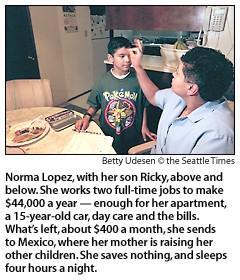|
|
|||
|
|
Monday, November 6, 2000, 8:00 a.m. Pacific
Service workers find jobs easily, yet low wages stay part of the deal
By Susan Gilmore and David Heath
|
||||||||||||||||||||
|
By day, she cleans a Lynnwood apartment complex. By night, she scours the Eastlake Avenue office building that houses the Bill and Melinda Gates Foundation.
That her life intersects with that of the world's richest man does not escape her.
'I need to do it. I pray to God, give me strength. My mind and body complain, but little Ricky gives me strength.' |
Lopez's 16-hour days typify this era of prosperity and paradox for low-wage service workers in the Puget Sound area. Work is plentiful, but financial security seems as elusive as ever.
Losing ground at median wage
From 1990 to 1998, despite robust economic growth and the creation of great wealth at the top of the scale, King County's median full-time wage, $38,100, actually lost $200 in purchasing power, according to a Seattle Times analysis of wage data. The Times compared wage increases to the Seattle-area Consumer Price Index, which reflects sharply higher housing costs. Median means half the county's workers made more, half less.

The Times found that the lower the wage, the farther workers fell behind in purchasing power. Conversely, the highest-paid workers enjoyed the biggest raises.
The typical King County household outpaced inflation -- but largely by working more. Unemployment dropped, more one-income families became two-income families, and two-income families worked more hours. A report by the Economic Policy Institute, a Washington D.C.-based think tank, estimated that from 1989 to 1999, middle-class, married-couple families worked six weeks more per year.
Despite shortages of workers to fill low-end service jobs, wages are rising slowly, said Linda Barrington, an economist at the New York-based Conference Board, a nonpartisan business research group. The fact that a local car wash can't hire enough people willing to work at low wages doesn't mean customers are willing to pay more to have their cars buffed.
"Simply having more money doesn't mean you're willing to pay more for hamburgers at McDonald's or for that car wash," Barrington said.
"This is just a new gold rush," she added. "Those in high tech hit it rich and are driving up costs, while those who have a high-school education or different careers are panning the gold. It's shock time."
Soaring real-estate prices offset much of the gains of the poor and middle-class. The median price for a single-family home in King County is $245,000; the average rent for an apartment is $792 a month.
Many low-income people who struggle to pay these rents can only dream of some day being able to buy a house. Even though their incomes are rising, this doesn't change one fundamental dilemma for single parents -- raising kids on one paycheck is extremely difficult in the Seattle area.
Not only are housing cost skyrocketing, personal finances can be overwhelmed by the high costs of child care and health insurance. Experts expect wage increases for low-skill jobs to perpetually lag behind those for high-skill jobs.
"The Puget Sound economy is a very successful economy because the economy has industries that require high skills," said Roberta Pauer, regional economist with the State Employment Security Department.
That's great for the highly educated or highly skilled, said Pauer, but not so great for the rest.
High-school degrees don't go far in this economy. A national study by the U.S. Census Bureau and the Bureau of Labor Statistics found those with professional degrees earned an average of $71,100 in 1997 while those with only a high-school education averaged $26,000.
'It was my choice to do what I did. If I go to college and become a nurse, it will be my dream.' |
The family doesn't qualify for food stamps or other welfare benefits, except for medical coupons for the children, because Burgos-Erazo's husband, a janitor, earns about $2,500 a month, too much to qualify.
But with diapers, rent, utilities, and food, the money doesn't stretch nearly far enough.
"We save pennies in a piggy bank and live paycheck to paycheck," she said. Her husband gets paid twice a month; the first check goes for the rent, the second for the rest of the bills -- $60 for a telephone, $60 for a cell phone, $400 in car payments, $200 for food. A treat might be a pizza.
While Burgos-Erazo said she's never had a job, she's hoping someday to become a nurse. She recently enrolled at Green River Community College.
She is jealous of those capitalizing on the new economy, she said, but not resentful.
"They finished their schooling and went on to college. It was my choice to do what I did," she said. "If I go to college and become a nurse it will be my dream."
That, and someday owning a home.
Burgos-Erazo' family illustrates Pauer's point.
"They fundamentally can't compete," she said. "You add the price of housing and the Microsoft stock-option problem and that's a double whammy for these people."
This economy also poses a dilemma for highly educated workers not motivated by high salaries.
When Rachel Kessler had her baby a year ago she had to quit her job at a Wallingford day-care center. She couldn't afford to work.
The money she made working full-time, $14,000 a year, would barely pay child-care costs for her daughter.
A University of Washington honors English graduate, Kessler said she loves day-care work but couldn't live on the $8 an hour she was earning.
"It's a really rewarding work. It makes people willing to put up with not owning a car, living paycheck to paycheck," she said. "I chose the work because it's more important to me to be fulfilled by work than have material wealth."
But when she was pregnant and went to a public-health clinic for prenatal care, she said, she was lectured by the social worker: Now that she was becoming a mother she needed to grow up, she was told, and get a real job that paid real money.
She and her boyfriend had to move out of Wallingford because the rents were too high and now they manage the building they live in on Capital Hill. Kessler also does freelance writing.
Her boyfriend, Michael Seiwerath, heads the Northwest Film Forum, which runs the Grand Illusion and Little Theaters. Between operating the theaters and managing the apartment building, he figures he works at least 50 hours a week.
Because they manage the apartment building, they live rent free, saving about $1,000 a month on their one-bedroom unit, but the couple earns less than $2,000 a month and life is a struggle.
Seiwerath said he has friends who work for dot-coms who are now millionaires, a path he figures he could have taken if he'd been willing to work long hours and give up a job he loves.
"It doesn't bother me that people have a lot of money because I'm choosing to do something that doesn't pay well," he said. "But it's frustrating. With the cost of living, we'll probably never own a house in Seattle.
"Most people in dot-coms are engaging in delayed living," Seiwerath added. "They work 70 hours a week in their 20s and hope in their 30s they will pull their head up and start living."
It's something Lopez can only dream about. She packs two full-time jobs into one work day and gives herself just one half-hour each afternoon to eat, visit her 7-year-old son and leave for her second janitor job.
She's worked two jobs for six years and has been on welfare only once, when she delivered her son by Caesarean section and was forced to be off work for several weeks.
Lopez left her three teenage children with her mother in Mexico because she can't afford to raise them in Seattle. Her dream is to bring them to live with her in America, perhaps as early as next year. And she dreams of someday owning a home, "where we're free to shout, make loud noises and no one would complain. Then maybe I could buy Ricky a puppy.
"I need to do it," she said of her difficult life. "I pray to God, give me strength. My mind and body complain, but little Ricky gives me strength."
Her friends tell her to slow down, not to work so hard. "I say, tell me how. I need to work, or win Lotto.
"It's hard. Ricky asks me, 'Why can't you stay with me and help with my homework like other moms do?' I explain, 'Sweetie, you don't have a father. I have your grandma and brothers and sisters to support.' He doesn't really understand."
But she doesn't resent those on the other side, who own the high-tech high-rises she cleans.
"God created everybody the same. When you're dead, you're buried in the same place. You take nothing with you."
Susan Gilmore's phone message number is 206-464-2054. Her e-mail address is sgilmore@seattletimes.com.
David Heath's phone message number is 206-464-2136. His e-mail address is dheath@seattletimes.com
| Background, Related Info & Multimedia: |
|
| Job growth at the extremes | |
| Jobs grew faster than people | |
| What people make |
![]()
| [ seattletimes.com home ] [ Classified Ads | NWsource.com | Contact Us | Search Archive ] |